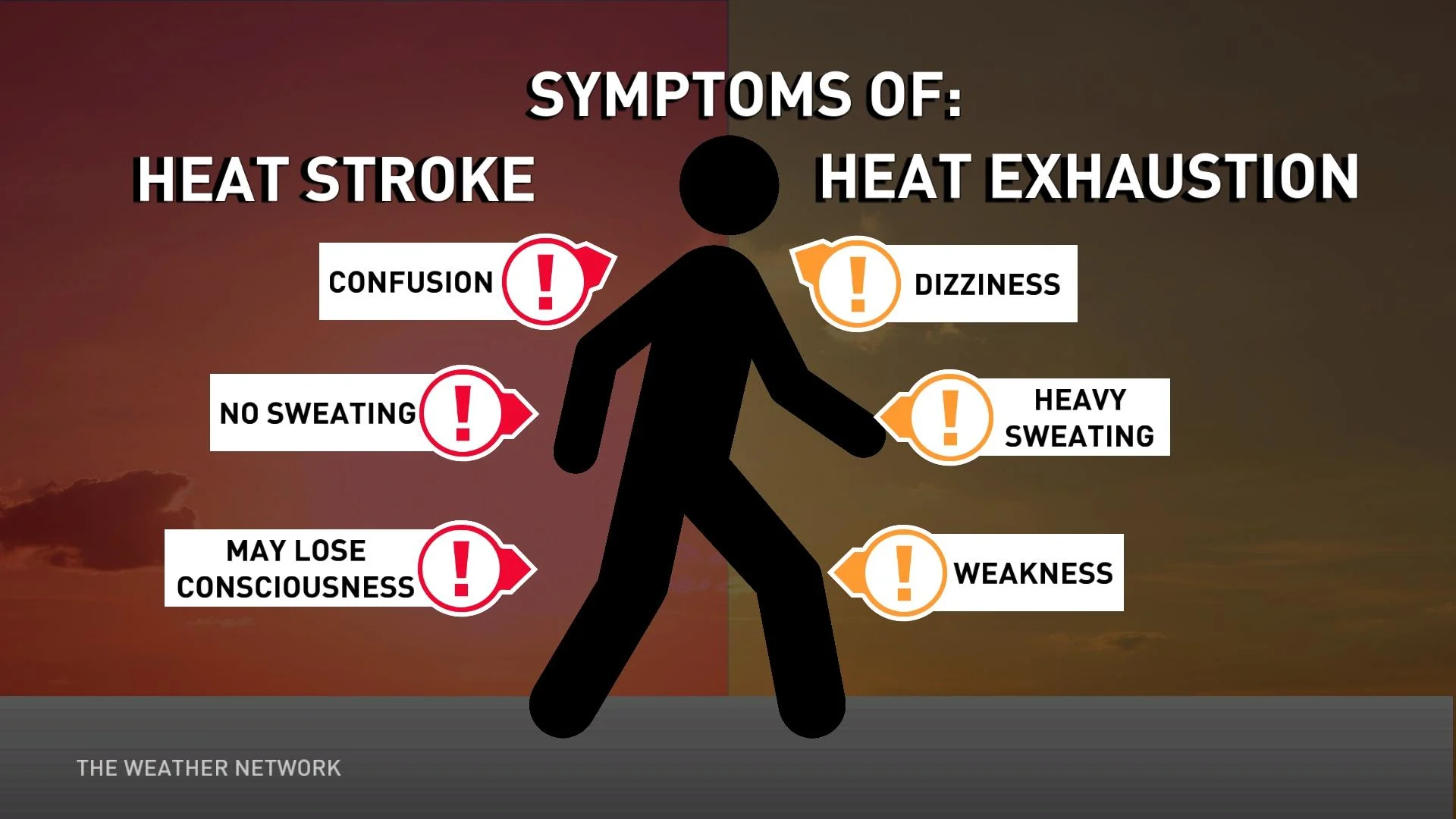
How hot weather can worsen some pre-existing health conditions
Hot weather can be hard on the body – and may even worsen some health conditions
Written by Adam Taylor, Lancaster University
The current weather forecast suggests some of Canada's hottest weather yet this year has arrived, with heat warnings issued for a large swath of the country.
While some may be rejoicing after a sputtering start to the season, it’s worth remembering that hot temperatures can be dangerous. Heat stroke is a risk for anyone – though the elderly and people with underlying health conditions are particularly at risk.
Certain health conditions can also be made worse when it’s hot outside. So if you’re someone who has a heart, lung, kidney or metabolic condition, it’s worth being extra careful during the hot weather.
RELATED: Taking medication on a hot day? What you should know
Heart conditions
Many cardiac conditions become worse during hot spells because the cardiovascular system has to work harder than usual. This is because it plays an important role in the body’s built-in cooling processes. The heart helps move heat away from vital systems, and brings blood to the skin’s surface in order to cool it down.
As such, the heart works much harder during hot weather – beating up to ten times more per minute for every 1°C temperature increase. Blood flow to the skin is also increased to between six to eight litres per minute, which also spikes the heart rate in order to try and cool the body.
RELATED: Heat waves can damage organs, new study suggests
People of course also sweat more during hot weather so the body can cool itself. But if they don’t drink enough fluid, this results in thicker blood. This, too, means the heart has to work harder.
All of these changes can worsen heart condition symptoms.
For example, people with heart failure may find hot weather particularly challenging. Cooling processes such as sweating and vasodilation (widening of the blood vessels) are impaired by this condition. This makes the heart work harder. People with coronary artery disease may also experience chest pain (angina) if they exert themselves during the hot weather, due to the added pressure of these cooling processes.
People with heart arrhythmias, particularly atrial fibrillation, are at increased risk of death during hot weather. A 1°C temperature increase, typically above 22°C sees a significant spike in deaths from arrhythmias and other heart conditions – particularly in women, over-65s and those living in tropical climates or in lower-middle income countries.
Regardless of your specific condition, studies show that for every day of extreme heat, there’s a 0.12% increase in the number of monthly deaths directly related to cardiovascular conditions.
Between 1990 and 2019, the number of heat-related cardiovascular disease deaths per year has increased from 13,000-93,000 deaths per year. Many other studies have shown similar trends.
Heat’s effects on the cardiovascular system can even be seen for three to four days after temperatures have fallen. This illustrates just how challenging hot weather is for the body.

(The Weather Network)
DON'T MISS: Experts warn to stop doing this with your baby during hot summer days
Respiratory conditions
Hot weather aggravates many respiratory conditions.
People with asthma made find their symptoms are worse when it’s hot. This is because hot weather increases the presence of particulates and allergens in the air which irritate and inflame the lungs and blood vessels when they enter the bloodstream.
The poor air quality on hot days due to particulate matter and allergens also means people with chronic obstructive pulmonary disease are at increased risk of death during the hot weather. Studies have shown that even a single degree increase in indoor temperatures can worsen symptoms – leading to greater use of rescue medicines, hospitalisations and a decline in lung function.
Even people without a respiratory condition may find their lung function suffers when hot temperatures arrive. This may also be due to particulates in the air, and the diversion of blood to the skin to help cool us down.
WATCH: What you need to know about heat-related illness
Kidney conditions
The kidneys play a critical role in fluid and electrolyte balance. This means they come under increased strain during hot weather – especially if we become dehydrated. Dehydration makes blood thicker, making it harder to filter waste.
Dehydration also explains why hot weather can cause a 30% increase in morbidity kidney disease. A rising global climate also makes kidney stones more common.
The challenge is even greater for those on dialysis, who have a limited daily fluid intake. People with kidney disease who live in hot climates may even see their kidney function drop an extra 8% per year compared to those living in temperate climates due to the added strain of heat on kidney function.
WATCH: How living in a heat dome can impact your body
Metabolic conditions
People who are overweight or obese may struggle more in the heat as their body may not be able to remove heat as efficiently. One reason for this is that, on average, they have a higher basal metabolic rate – the amount of calories needed to keep cells functioning. This means they’re already generating more heat energy within their body without the extra pressure of hot temperatures outside. Their heart may also have to work harder to keep their core body temperature cool.
People with diabetes are also at increased risk of heat-related illnesses. In the UK alone, the number of type 2 diabetics needing healthcare increases for every 1°C temperature increase that happens over 22°C.
Type 1 and type 2 diabetes impair the body’s ability to dissipate heat as it reduces blood flow to the skin and sweating – both key in taking heat from the body.
High blood sugar damages the blood vessels as well. This can have a serious impact on how efficiently the body removes heat from the body.
To protect yourself, the best things to do are staying out of the sun during the hottest part of the day, drinking plenty of fluids (not alcohol) to replace what’s lost as sweat, putting your feet in a bucket of cold water (or lukewarm shower if you prefer) and a cool flannel on the forehead or back of the neck.
This all reduces the temperature of your blood when it goes back to the central organs, helping to reduce their core temperature and dissipate heat away from them.

Written by Adam Taylor, Professor and Director of the Clinical Anatomy Learning Centre, Lancaster University
This article is republished from The Conversation under a Creative Commons license. Read the original article. Minor edits made by The Weather to include weather information regarding Canada.
Thumbnail stock image credit: Liubomyr Vorona via iStock/Getty Images Plus. Creative #: 2148462560.









